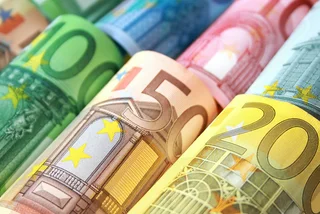The Czech crown was one of the best-performing currencies during the pandemic, according to analysis by Bloomberg, as reported by Kurzy.cz. Between 2019 and 2022, the crown strengthened by 5.4 percent, thus performing much better than other European currencies.
The pledge of the Czech National Bank (CNB) to “prevent excessive currency depreciation” was one of the reasons for the crown's recent strong performance, according to Bloomberg. The currency is currently trading close to its strongest levels against the euro in over 11 years.
By the end of 2019, the crown was trading at CZK 25.4 to EUR 1. It depreciated to CZK 26.2 by the end of 2020, before strengthening to 24.8 at the end of 2021. Following a small spike in inflation in the first quarter of the year – due to the Russia-Ukraine war – it has strengthened further, to about CZK 24 as of now.

“The crown is entering the new year under the national bank’s continued protection, which we don’t expect to go away any time soon,” the financial firm assessed.
Stronger than its neighbors
Analysts from Raiffeisen bank also said that the currently strong exchange rate “is helping the CNB fight inflation.” Year-on-year inflation registered over 16 percent in November 2022 (according to the latest available data).
In stark comparison to the crown, the Polish zloty lost 9.2 percent and the Hungarian forint 17 percent.
The crown is among the top four best-performing currencies in the world since the end of 2019, along with the Swiss franc, Singapore dollar, and Chinese yuan.
The CNB artificially used CZK 700 billion from foreign exchange reserves to strengthen the crown, and now “has enough ammunition for at least a few months to protect the Czech currency and prevent excessive volatility or any significant weakening," investment strategist of investment firm Conseq told ČT24.
The Czech currency’s strong position indicates, according to economist Lukáš Kovanda, that the crown “enjoys a high degree of trust” from global investors.
End of strengthening might be in sight, economists say
Despite the koruna’s strong performance, some economists are skeptical about whether it will continue. “I think that the foundation [Czechia’s economy] does not correspond to any major strengthening," chief economist of bank Creditas Petr Dufek told ČT24. "We will return to somewhere around CZK 24.5 [to EUR 1]," he added.
Chief Economist of Cyrrus investment firm similarly noted in Lidovky.cz that the current exchange rate is “not sustainable.”
The government yesterday announced its third-largest budget deficit in Czechia’s history and the surging of public debt to almost CZK 2.9 trillion. Weak domestic fundamentals may, therefore, partially weaken the crown's impressive growth in 2023.












 Reading time: 2 minutes
Reading time: 2 minutes 





























